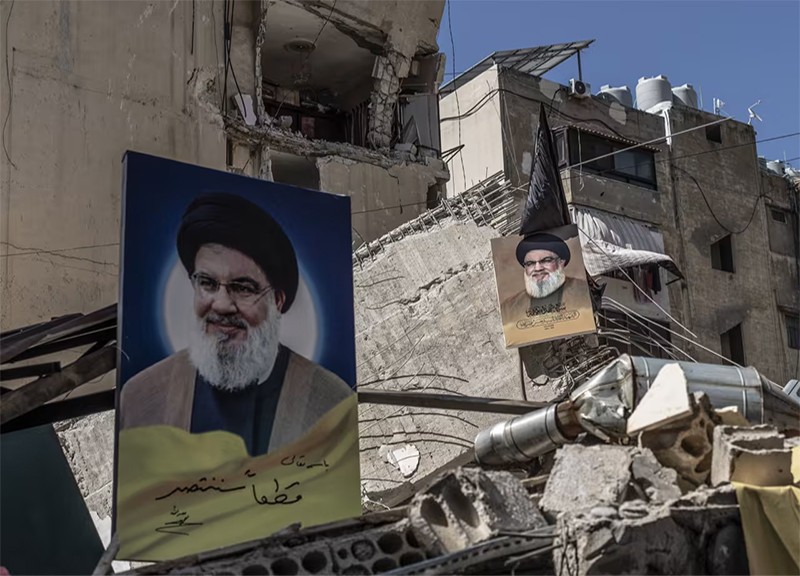
Biden administration seeks government free of militants’ influence in wake of Israeli strikes
By Jared Malsin, Summer Said and Adam Chamseddine. WSJ.
BEIRUT—The Biden administration is pushing to use Israel’s offensive against Hezbollah as an opening to end the militant group’s long-running dominance by electing a new Lebanese president, U.S. and Arab officials familiar with the discussions said.
Secretary of State Antony Blinken called the leaders of Qatar, Egypt and Saudi Arabia in recent days to ask them to support the election of a new Lebanese president. Senior White House official Amos Hochstein also has told Arab officials that the weakening Hezbollah by Israeli attacks should be viewed as an opportunity to potentially break a political impasse. The country's political parties have been unable to agree on a president since the previous leader, Michel Aoun, left office at the end of his term in 2022.
The U.S. initiative aims to address frustrations with years of ineffective government that have prevented reforms and entrenched the power of Lebanon's political elites, including Hezbollah, which also is an influential political party. The effort marks a shift from the administration's calls just weeks ago for an immediate cease-fire, and some in the country and region fear pressing to empower a candidate now could set off the sort of sectarian fighting that has torn apart the country in recent decades.
"What we want to see come out of this situation, ultimately, is Lebanon able to break the grip that Hezbollah has had on the country-more than a grip, break the stranglehold that Hezbollah has had on the country and remove Hezbollah veto over a president," State Department spokesman Matt Miller told reporters this week.
Years of U.S.- backed efforts to impose reforms on Lebanon's government have led to few changes. The country's society is fractured by sectarian and political divisions that were entrenched during French occupation after World War I, with elites from its major groups-Sunni Muslims, Shia Muslims, Christians and Druze—divvying up government portfolios.
The U.S. initiative to push Hezbollah from power has support from Saudi Arabia, Saudi officials familiar with the matter said. The Persian Gulf country until recent years played a big role inshaping the political and economic course of Lebanon.
The U.S. initiative hinges on key Lebanese leaders including Prime Minister Najib Mikati and Parliament Speaker Nabih Berri, the leader of another Shiite faction and a key conduit to Hezbollah in cease-fire negotiations, who would be needed to bring Lebanon's political factions together to elect a new president, according to diplomats familiar with recent discussions. Lebanon's president is the commander in chief of the armed forces and is seen as being a key to putting in place an empowered government that could better handle the current crisis.
Mikati and Berri last week said they supported the election of a new president, but have expressed appreciation for Hezbollah in its battle against Israel. Hezbollah's de facto leader, Deputy Secretary-General Naim Qassem, has rejected calls for a political change during the war.
Lebanon's president is elected by the country's 128- member Parliament, where no single bloc has the seats to choose a new leader on its own. Without the support of Hezbollah and its allies, it isn't clear how a political cosensus would come together.
Officials from Egypt and Qatar-which have played a key role in truce talks in Gaza and Lebanon-told U.S. officials they view the American plan as unrealistic and even dangerous. In talks with U.S. officials, they have argued that Israel will never destroy Hezbollah, and that the group must be a part of any political settlement to the conflict.
Egypt also has expressed the concern that meddling in Lebanese politics during the crisis could heighten the risk of internecine fighting in a country that suffered a debilitating civil war that ended in 1990.
Anyone seen as taking power as a result of Israel's attacks on Lebanon could face blowback from the Lebanese public and rival political forces, political analysts and diplomats said.
Lebanon's lack of a president has left it with a care-taker government for the past two years, a leadership vacuum that has worsened the country's economic crisis, which the World Bank says is one of the worst in the past century and a half.
Lebanese officials are skeptical that any force in the country can challenge the country's political elites. "We lack any leadership to at least initiate a course where we can see a light at the end of the tunnel," said Ibrahim Mneimneh, a reformist member of Parliament.














